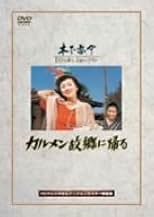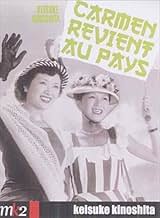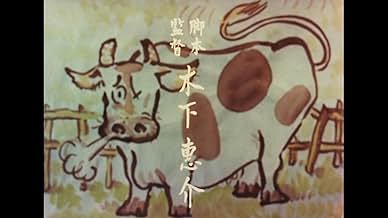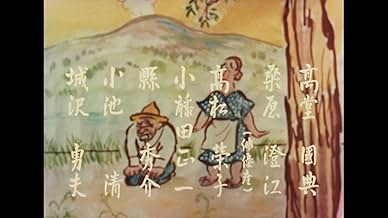A girl who had left her home village for life in Tokyo returns to her home years later, and evokes a scandal when the locals discover that she's a stripper.A girl who had left her home village for life in Tokyo returns to her home years later, and evokes a scandal when the locals discover that she's a stripper.A girl who had left her home village for life in Tokyo returns to her home years later, and evokes a scandal when the locals discover that she's a stripper.
- Awards
- 1 win total
- Director
- Writer
- All cast & crew
- Production, box office & more at IMDbPro
Storyline
Did you know
- TriviaThe first Japanese color film.
- GoofsWhen Carmen and Maya are in the field and Carmen shoves Maya, the camera cuts to a closeup of Maya looking upset, but in the shot before she can be seen laughing under the brim of her hat as Carmen knocks her down.
- Quotes
The principal: It's a violation of human rights to go against her will to dance. Nowadays, profiteering evils like bicycle racing are allowed to flourish. Maruju's scheme for a nude dance show may be less offensive in comparison.
- ConnectionsFeatured in The Discarnates (1988)
Featured review
For years, I had thought that Teinosuke Kinugasa's GATE OF HELL (1953) was Japan's first color movie. I had read that somewhere as a film student many years ago and in all this time I never came across any mention of earlier Japanese color films. Until this year. In reading Yoshihiro Tatsumi's autobiographical manga, "A Drifting Life," I stumbled upon a reference to CARMEN COMES HOME (1951), described in the manga as "Japan's first color film." Needless to say, I was astounded by this discovery and began looking for more information about it. Some of the reference sources I have do indeed accurately cite this film, so I have no idea where I came across that original erroneous mention of GATE OF HELL. Eager to see CARMEN COMES HOME, I asked around on the web and got word that YesAsia was selling it on DVD-with English subtitles-so I bought it.
The previous review, by "toclement," touches on many of the film's virtues in as concise a manner as you're likely to find on IMDb, so I hope not to repeat what was said, but simply to add to it. The most important aspect of the film for me is, of course, the color cinematography, beautifully captured in this expert DVD transfer. (According to the book, "The Japanese Film: Art and Industry," by Joseph L. Anderson and Donald Richie, the process used was Fujicolor.) The film was shot almost entirely on location in a farm town at the foot of Mount Asama, an active volcano on the central Japanese island of Honshu. Many of the shots are framed with Mount Asama majestically rising in the background, with steam sometimes seen escaping from the volcano. There are hilltops and green meadows abounding where the lead character, Carmen, accompanied by her friend, Maja, takes off her shoes and runs through the grass, dancing and frolicking in bursts of spontaneous joy. Nearly every shot is drenched in sunlight and the bright colors of Carmen's and Maja's costumes and the redness of their lipstick dazzle the viewer in every scene. Adding to the splendor is the way Carmen bursts into song, entirely on her own, in scene after scene. She may be visiting her childhood hometown for the first time in years, but she's wrapped up in her own self-created universe and she takes it with her wherever she goes.
It's quite unlike any other Japanese film I've seen. Most Japanese films I see have urban settings or historical settings or are science fiction films set in the future, on spaceships or on other planets. Rarely have I seen films about contemporary rural life in Japan, especially in color. And this film shows us numerous details about small town life in Japan and the people who live it. As the previous reviewer indicated, the film never seeks to judge its characters (with one notable exception), but simply presents them to us as they are, warts and all. It's an amusing film, with lots of humorous behavior, but it's never condescending. It's also never laugh-out-loud funny, precisely because it avoids the contrivances, farcical touches and melodramatic highs and lows that characterize traditional movie comedy. The humor arises from obvious collisions between the manners of aggressive citified showgirls and those of the more laidback country folk. In one scene, Maja flirts quite openly with Mr. Ogawa, the young schoolteacher. His reaction? He complains to Carmen's amused brother-in-law that Maja was "bullying" him. Carmen herself is a flamboyant character, but she's never larger than life. We come to understand her, particularly after her father offers a revelation about a childhood incident that might account for her behavior. She's not the sharpest knife in the drawer and would surely be quite a handful in any relationship, but she's still cute, endearing and fun to take in small doses.
The one character on whom the film casts judgment is Maruju, the local businessman who pretty much runs the town. He sees himself as a beneficent entrepreneur, seeking to promote art and culture when he offers to let Carmen and Maja perform their racy dance act for the town-for 100 yen a ticket! He is berated by Carmen's father and the school principal, but, in the end, Maruju's not such a bad sort after all. In fact, it was always Carmen's dream to find a way to share her "art" with her hometown audience. Which she does, most memorably. And a handful of characters benefit in varying, but important ways. And it's Maruju who makes it possible.
The film is filled with character types familiar from Japanese films. The school principal, played by Chishu Ryu, famous for his roles in Yasujiro Ozu's films, is something of a caricature, a rigid defender of Japanese culture and tradition, like someone out of the 19th century, who comes to regret his initial endorsement of Carmen's visit. A running gag has him turning to Mount Asama to sing traditional folk songs in praise of the mountain. Still, these characters are all far less exaggerated than they would have been in a similarly-themed Hollywood comedy, the kind in which everybody would have been transformed in some way by Carmen's visit. (Mae West may have made something in that vein in the post-pre-Code 1930s.) In this film, the town is left with a couple of subtle positive effects, but Carmen is no different when she leaves than when she arrived.
I've seen a handful of other Japanese color films made in the 1950s, including GATE OF HELL (1953), the SAMURAI trilogy (1955), JANKEN MUSUME (1955, also reviewed on this site), RODAN (1957), OHAYO (1959), and THE MYSTERIANS (1959). Now I'd like to see more. [UPDATE: I've seen many more color Japanese films from the 1950s in the 12 years since I did this review, from many different genres, some of which I've reviewed here. TCM will be running this film on the morning of April 4, 2022, which is why I came back to check my review.)
The previous review, by "toclement," touches on many of the film's virtues in as concise a manner as you're likely to find on IMDb, so I hope not to repeat what was said, but simply to add to it. The most important aspect of the film for me is, of course, the color cinematography, beautifully captured in this expert DVD transfer. (According to the book, "The Japanese Film: Art and Industry," by Joseph L. Anderson and Donald Richie, the process used was Fujicolor.) The film was shot almost entirely on location in a farm town at the foot of Mount Asama, an active volcano on the central Japanese island of Honshu. Many of the shots are framed with Mount Asama majestically rising in the background, with steam sometimes seen escaping from the volcano. There are hilltops and green meadows abounding where the lead character, Carmen, accompanied by her friend, Maja, takes off her shoes and runs through the grass, dancing and frolicking in bursts of spontaneous joy. Nearly every shot is drenched in sunlight and the bright colors of Carmen's and Maja's costumes and the redness of their lipstick dazzle the viewer in every scene. Adding to the splendor is the way Carmen bursts into song, entirely on her own, in scene after scene. She may be visiting her childhood hometown for the first time in years, but she's wrapped up in her own self-created universe and she takes it with her wherever she goes.
It's quite unlike any other Japanese film I've seen. Most Japanese films I see have urban settings or historical settings or are science fiction films set in the future, on spaceships or on other planets. Rarely have I seen films about contemporary rural life in Japan, especially in color. And this film shows us numerous details about small town life in Japan and the people who live it. As the previous reviewer indicated, the film never seeks to judge its characters (with one notable exception), but simply presents them to us as they are, warts and all. It's an amusing film, with lots of humorous behavior, but it's never condescending. It's also never laugh-out-loud funny, precisely because it avoids the contrivances, farcical touches and melodramatic highs and lows that characterize traditional movie comedy. The humor arises from obvious collisions between the manners of aggressive citified showgirls and those of the more laidback country folk. In one scene, Maja flirts quite openly with Mr. Ogawa, the young schoolteacher. His reaction? He complains to Carmen's amused brother-in-law that Maja was "bullying" him. Carmen herself is a flamboyant character, but she's never larger than life. We come to understand her, particularly after her father offers a revelation about a childhood incident that might account for her behavior. She's not the sharpest knife in the drawer and would surely be quite a handful in any relationship, but she's still cute, endearing and fun to take in small doses.
The one character on whom the film casts judgment is Maruju, the local businessman who pretty much runs the town. He sees himself as a beneficent entrepreneur, seeking to promote art and culture when he offers to let Carmen and Maja perform their racy dance act for the town-for 100 yen a ticket! He is berated by Carmen's father and the school principal, but, in the end, Maruju's not such a bad sort after all. In fact, it was always Carmen's dream to find a way to share her "art" with her hometown audience. Which she does, most memorably. And a handful of characters benefit in varying, but important ways. And it's Maruju who makes it possible.
The film is filled with character types familiar from Japanese films. The school principal, played by Chishu Ryu, famous for his roles in Yasujiro Ozu's films, is something of a caricature, a rigid defender of Japanese culture and tradition, like someone out of the 19th century, who comes to regret his initial endorsement of Carmen's visit. A running gag has him turning to Mount Asama to sing traditional folk songs in praise of the mountain. Still, these characters are all far less exaggerated than they would have been in a similarly-themed Hollywood comedy, the kind in which everybody would have been transformed in some way by Carmen's visit. (Mae West may have made something in that vein in the post-pre-Code 1930s.) In this film, the town is left with a couple of subtle positive effects, but Carmen is no different when she leaves than when she arrived.
I've seen a handful of other Japanese color films made in the 1950s, including GATE OF HELL (1953), the SAMURAI trilogy (1955), JANKEN MUSUME (1955, also reviewed on this site), RODAN (1957), OHAYO (1959), and THE MYSTERIANS (1959). Now I'd like to see more. [UPDATE: I've seen many more color Japanese films from the 1950s in the 12 years since I did this review, from many different genres, some of which I've reviewed here. TCM will be running this film on the morning of April 4, 2022, which is why I came back to check my review.)
- BrianDanaCamp
- Dec 11, 2009
- Permalink
Details
- Runtime1 hour 26 minutes
- Sound mix
- Aspect ratio
- 1.37 : 1
Contribute to this page
Suggest an edit or add missing content





























